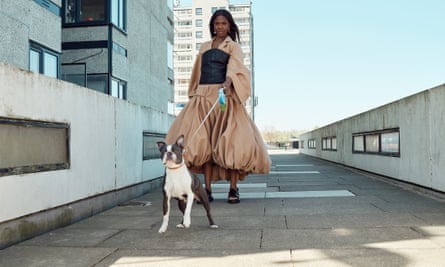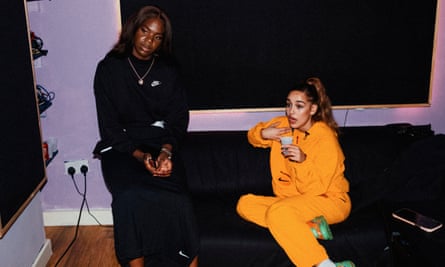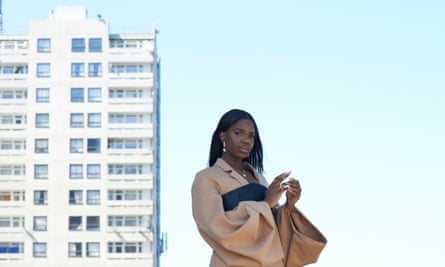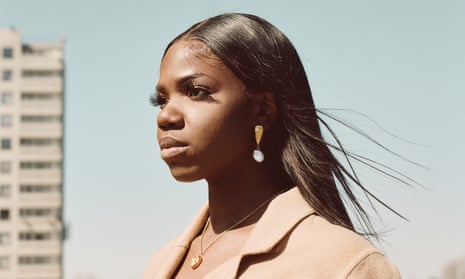In the depths of a bleak Covid winter, very few of us were feeling peng. With Zoom meetings and state-mandated daily walks our only form of socialising, there was little to dress up for, and few opportunities for us to feel beautiful.
Then came a song that changed it all. Peng Black Girls – a track by the up-and-coming south London rapper Enny – was released in October 2020, but thanks to a December remix, it snowballed into a viral sensation that served as an antidote to lockdown gloom. The lyrics and video, which showcase her community in all its glory, are a love letter to Blackness, womanhood, and crucially pengness (a London slang word that essentially means “hotness”).
Enny, born Enitan Adepitan, connects with me over video from her car, and instantly starts breaking down the politics in her lyrics. When Black women are so often either erased by the media, or held to impossible scrutiny when it comes to the way we look, on Peng Black Girls, Adepitan calls out the fact that women who aren’t Black are praised for embodying those same traits: “Want a fat booty like Kardashians? / No / Want a fat booty like my Aunty got, yo.”
Another of the song’s overarching themes is our diversity: “Dark skin, light skin, medium tone / Permed tings, braids, got minis afros / Thick lips got hips some of us don’t / Big nose contour some of us won’t”. The reference to contouring – a makeup technique that enhances the appearance of features like the nose and cheekbones – feels particularly notable, as it ties into wider conversations about beauty standards in the Black community.
“That line’s dedicated to me, man!” Adepitan laughs cheekily. “I remember when I was really young, someone told me that I don’t have a bridge on my nose … I was looking in the mirror like: ‘Oh my God, I don’t have a bridge on my nose! I have a really African nose!’ For a long time, that was like a stigma for me. So writing the song helped me just get comfortable in my own skin, and my own insecurities.”
As well as having a therapeutic effect for Adepitan, the song has seen the artist thrust into the limelight: she has been heralded as the future of rap by Vogue and GQ, while Notion magazine called her “one of the most exciting figures in the current UK music scene”, and, crucially, “someone you’d like to be friends with”. Meanwhile, Peng Black Girls has been shared by the likes of Skepta and Summer Walker, with both the original and remix cumulatively amassing more than 12m views.
In Adepitan’s other videos – notably, Same Old, which sees her marching through the streets of London and taking on the topic of gentrification – she exudes confidence, flipping her hair, staring down the lens and gesturing in the air with brightly manicured nails. It is a different side to the Enny I meet today. As we speak, she occasionally angles the phone camera to the roof of the car, so only her forehead scrapes the bottom of the frame, or looks out of the car window. “I’m deffo shy,” she says.
“I wasn’t really like the child that would play outside; I was always in my room,” she continues. “My dad taught me how to play the keyboard … and so I would do that all the time.” Her family’s tastes played a key role in nurturing her interest in music; Lauryn Hill and Stevie Wonder in particular.

Enny wears dress by Loewe, shoes by Grenson, jewellery by Alighieri.
Despite going to university and trying other careers, Adepitan kept making music – and got noticed by local radio stations for a freestyle version of her song He’s Not Into You. That is what put her on the radar of Root 73, an artist-development programme run by people born and raised in Hackney, east London.
“I met Root 73 in 2019 through my now-manager” – Adepitan turns the camera to Pascal, who’s sitting nonchalantly in the driver’s seat, and cackles. “He brought me into Root, which was the studio he was working out of, and they became family. They really took me in, putting me on stage and stuff like that early on, when I only had about three songs,” she says.
Considering her shyness, what were her first experiences on stage like? “Horrible!” she shouts. “I had to drink a lot of alcohol just to get the juices going.”
After the pandemic broke out and the gigs ended, Adepitan released Peng Black Girls, and by the end of the year it had blown up. The remix, which featured her label-mate Jorja Smith singing the hook rather than former collaborator Amia Brave, had been released via the streaming channel Colors. The video racked up millions of views in a number of days.
The fact that it was this video – which swapped out Brave in favour of the lighter-skinned Smith – that brought the song to prominence, attracted scrutiny from listeners. To many, it looked like colourism – made more biting by the fact that it’s a song about Black women’s empowerment. While Adepitan and Brave have acknowledged the optics of the decision, both suggested that the situation is complex, with Adepitan telling Crack magazine that Smith would rake in more views, and Brave telling gal-dem: “In my heart of hearts, I don’t think they realised how it comes across.”
The original video, which features dozens of women, is a better vehicle for showcasing the diversity of Black womanhood – as well as Adepitan’s own background. Shot by the St Lucian north Londoner Otis Dominique, the video was mostly filmed in Adepitan’s native Thamesmead (other notable shoots in the area include Aphex Twin’s Come to Daddy and A Clockwork Orange). The marshland site turned brutalist housing project, which has for decades been cast off by politicians and planners as a “sink estate”, is undergoing regeneration.
She still lives in the area, at home with her parents, and says that it holds a special place in her heart. “When my brother and sister were younger, I know it was quite racist. They were maybe the only black people in the area at the time. But when I was older … it was home; there was a lot of community.

“So the hardest thing is watching [the disappearance of] things you grew up with – memories you associate with people that may not be here any more. When certain buildings go, you kind of feel like the people are going with them.”
This community spirit and solidarity threads through the video: friends standing around her; aunties in traditional Nigerian dress; her little cousins in matching orange raincoats and pink wellies. There is also a theme of adaptability: the action moves from wholesome shots in Adepitan’s living room by day, to sleek chic in a Croydon car park at night. “I wanted to show the different sides to how I grew up,” she says.
The message of the song, and the rest of her small body of work – tackling Boris Johnson’s premiership and cheating in relationships – clearly connects with a growing fanbase. In the YouTube comments for her tracks, a number of fans have dubbed her the “British Lauryn Hill”, while over on TikTok, Peng Black Girls serves as the backing track to videos of Black women and girls showcasing their makeup, hair and outfits. “That’s gassy,” she says. “I love seeing that. Black women are just so beautiful and I don’t feel like they get told it enough.

“[When the song came out] I got so many messages from young black girls, in Europe or in Asia, just saying that they felt ugly and now they feel beautiful … It kinda made me sad, because I realised that how I felt growing up sometimes was how thousands of girls are feeling right now. But it also felt special to know that it connected and made a difference.”
Online feedback seems to have been all the more significant for Adepitan given that she rose to fame during the pandemic. It has made for a strange introduction to the industry: the absence of live events means she is yet to meet many women in the business, other than Smith, whom she describes as a passionate perfectionist. “I think I’m still finding my footing,” she says.
When the industry resumes, there is a big world out there for Adepitan to explore. The last few years have seen a sudden boom for women in rap – from the success of Shygirl and Little Simz in the UK, to Megan Thee Stallion and Doja Cat across the pond. “It’s almost like a Renaissance moment for women who are taking a stand in what they want to do, and just being whoever they want to be when it comes to music. They’re not getting stuck in boxes, or focused on what they think that people might want to hear, or what labels are telling them to do. They’re just being themselves.
“Before Cardi [B] and Nicki [Minaj], it was Lil’ Kim and Missy Elliott, like you could pinpoint specific moments,” she says. “But now you’ve got hundreds of lady rappers.”
She admits that sometimes, as a Black woman, she feels the pressure of the industry looming over her. “I feel like that pressure was initially what kind of stalled me for a long time, because I always felt like there wasn’t a market for people that look like me ... for a dark-skinned Black rapper, especially one that was not going to rap about sex or stuff like that.
“But I’m going to die one day. I don’t want to have regrets and be like: ‘Oh, I didn’t do this because another human being thinks a certain way, or society is telling me that I can’t.’”
With a viral hit under her belt – plus a new upbeat party track, I Want, and an EP on the horizon – it looks as if Adepitan is going to have a huge summer. “Once outside is properly, properly open, I’m going everywhere!” she says excitedly, before reeling off just where: “I’m going to the clubs, I’m going to the festivals, I’m going to the restaurants.”
She pauses, the stage persona wearing off, and the introvert re-emerging: “I say that now, but I’ll probably stay at home.”
If that means more music, and more reasons to feel peng, then none of us can complain.
Enny’s next single, I Want, is out in June
